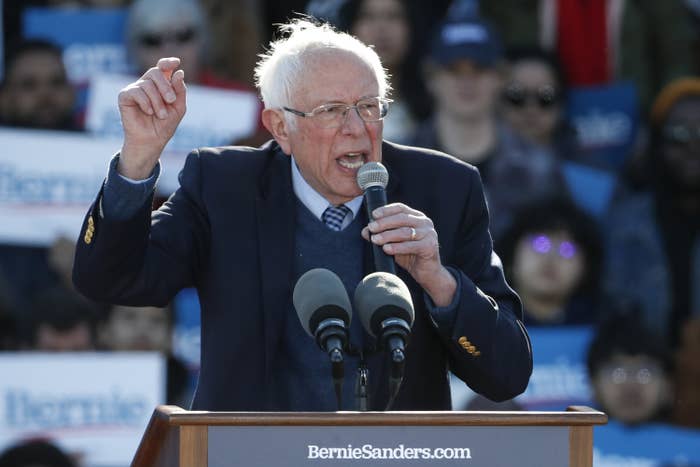
FLINT, Michigan — It was a rare move for the Bernie Sanders presidential campaign.
As the candidate prepared to fly to a town hall in Flint, Michigan — a state whose diverse working-class electorate could decide his future in the Democratic primary — an aide gathered reporters to make an announcement: Sanders would “directly address the African American community and make the case for why black voters should support him over Joe Biden.”
Everyone took note, tapping furiously on their phones.
It's not often that Sanders deviates from his core message about social and economic injustice, delivered daily to thousands of people across the country at rallies that clock in, as if by science, at 47 minutes. He hardly ever directs a speech to a specific demographic. And he almost never asks his campaign team to preview a major address to reporters in order to ensure coverage.
But a couple hours later, when Sanders stepped to the podium in Flint, he did not give his prepared remarks on race — instead delivering his familiar stump speech, making only brief mention of “a same old, same old status quo politics” that, he said, has “failed African American communities.”
After the event, as the campaign’s press bus idled outside the venue, Sanders’ communications director, Mike Casca, told reporters that the candidate scrapped his prepared remarks after discussing the event backstage with panelists, including community leaders in Flint and one of his top supporters, Cornel West.
The crowd in Flint, a majority-black city affected by a horrifying lead-contaminated water crisis, was mostly white on Saturday.
“It was a change they thought was important,” Casca said, describing the decision as both a deliberate one by Sanders and “one of those on-the-fly backstage moments.”
“They wanted to lift up the panelists’ stories.”
According to Casca, Sanders worked on the speech on plane rides between campaign events in Michigan and Illinois, two states that will vote in the Democratic primaries in March after a disappointing finish for Sanders against Biden last week in Southern states, where black voters made up the majority in Democratic primaries.
“They talked over the idea and decided it was probably better to let the people of color who were on the panel discuss instead of him giving a traditional speech,” said Casca.
“He does not have those experiences,” he added. “He is a white Jewish man.”
Casca said the drafts of the original speech aimed to contrast Sanders’ and Biden’s records on racial justice — but he declined multiple times to say on which policy areas or votes.
Asked whether the candidate will eventually deliver the speech, Casca said, “TBD.”
Sanders' town halls, designed as a platform for individual stories of the working class, became an unexpectedly emotional centerpiece of his second presidential campaign through the summer and fall. Although he has largely held traditional rallies since voting began in February, he has said he believes voters' stories can be a more effective tool than any speech.
The campaign billed Saturday's event as a town hall on "racial and economic justice."
All week, at campaign stops across Arizona, Michigan, and Illinois, Sanders has laced into Biden's decadeslong record on trade, economic issues, foreign policy, abortion, and LGBTQ rights. But he stopped short of doing the same with racial justice issues Saturday night.
Sanders, a 78-year-old independent from the mostly white state of Vermont, has struggled to attract, especially, middle-aged and older black voters to his coalition of young people, Latino voters, and white working-class voters.
"He didn't want to speak on behalf of people of color when there were people of color on the panel," said Casca.
Aside from a 30-minute speech at the start of the event, the six panelists spoke more than the candidate himself. Only at one point Saturday night did Sanders attempt to create an explicit contrast with Biden, teeing up a lengthy question for West, the famed scholar and progressive activist.
"Dr. West, there was a headline in today's Detroit News," he said, picking up a copy of the newspaper. "And the headline said, 'Biden sees advantage with Michigan black voters.' OK?" Sanders, still addressing West, began to list a litany of statistics about black Americans: a larger wealth gap, a higher poverty rate, a higher rate for the uninsured and underinsured, lower life expectancies, lower pay rates. Do you think, he asked West, given “the reality of the condition of the African American community right now, that supporting a status quo, same old, same old type of politician is going to address these issues?”
Sanders effectively asked West to make the case on his behalf.
The professor stood with the mic, praising Sanders as an exemplar of “integrity, honesty, and decency" who is "never up for sale" — before describing Biden as a "neoliberal centrist.”
“The neoliberalist who all of a sudden now is coming back to life — and the catalyst was my own black people. Oh, I'm so disappointed. Oh, I'm so upset,” West told the crowd in Flint.
“Skin pigmentation doesn't determine your moral and spiritual formation. You gotta decide who you are.”
Four years ago, Hillary Clinton effectively ended Sanders' first presidential campaign in the South, where black voters generally make up a majority of Democratic primary electorates and heavily favored her candidacy. Sanders, at times, struggled talking about race during the campaign, showing early frustration when he was interrupted by Black Lives Matter protesters and had occasionally uncomfortable interactions with activists.
“His framework is income inequality and economic justice. He sees that as the all-inclusive tent,” Curtiss Reed Jr., the executive director of the Vermont Partnership for Fairness and Diversity, said in a 2018 interview.
In the intervening years, Sanders has more often brought racial justice to the fore of his campaign; he speaks often of wanting to build a multiracial coalition. His theory of the 2020 campaign involved a massive turnout operation, in which working-class voters of all races would find common cause in issues like ending medical and educational debt, and along the way, convert nonvoters into voters.
The Sanders campaign heavily organized on the campuses of historical black colleges and universities in states like South and North Carolina, hoping to capitalize on his support among younger black voters.
But over the last two weeks, in exit polling and in the returns, Sanders has still struggled to make substantial gains with black voters, particularly those in the South and those who are over age 30.
What message did they hope Saturday night delivered to black voters?
"That Sen. Sanders stands with them," Casca said, "and his agenda would bring the most powerful change to their lives."
CORRECTION
The Democratic primary in Illinois is on March 17. A previous version of this story misstated the date.

